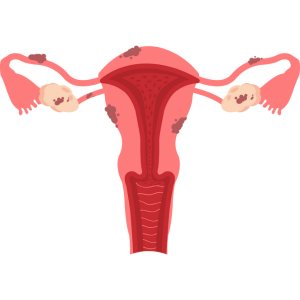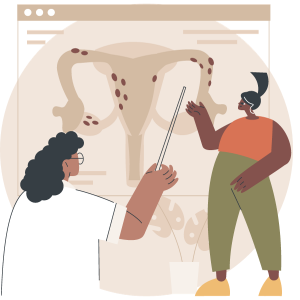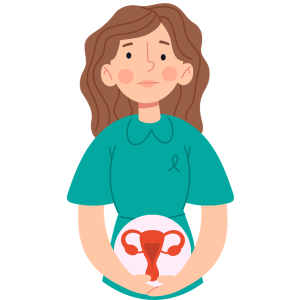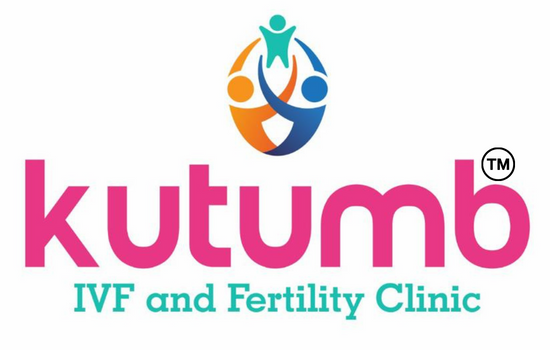 Endometriosis is a medical condition where tissue similar to the lining of the uterus grows outside the uterus. This can cause pelvic pain, discomfort during intercourse, and irregular menstrual cycles. One significant consequence of endometriosis is its potential to lead to infertility. The abnormal tissue growth can obstruct the fallopian tubes, interfere with egg implantation, and create an unfavorable environment for conception. For those facing infertility due to endometriosis, seeking assistance from fertility experts is crucial. We provide advanced reproductive technologies and personalized treatment options to enhance the chances of successful conception for individuals with endometriosis.
Endometriosis is a medical condition where tissue similar to the lining of the uterus grows outside the uterus. This can cause pelvic pain, discomfort during intercourse, and irregular menstrual cycles. One significant consequence of endometriosis is its potential to lead to infertility. The abnormal tissue growth can obstruct the fallopian tubes, interfere with egg implantation, and create an unfavorable environment for conception. For those facing infertility due to endometriosis, seeking assistance from fertility experts is crucial. We provide advanced reproductive technologies and personalized treatment options to enhance the chances of successful conception for individuals with endometriosis.
Symptoms of endometriosis can vary but often include:
Distorted Pelvic Anatomy: Endometriosis can lead to the formation of adhesions (scar tissue) and ovarian cysts, which may distort the normal pelvic anatomy. This can affect the proper functioning of the ovaries, fallopian tubes, and uterus, making it difficult for the egg to travel from the ovaries to the uterus and for sperm to reach the egg.
Inflammation: Endometriosis is associated with chronic inflammation. Inflammation in the pelvic cavity can interfere with the function of the reproductive organs, potentially affecting fertility.
Changes in the Micro-environment: The presence of endometrial tissue outside the uterus can create a hostile micro-environment in the pelvic cavity. This can impact the normal processes of ovulation, fertilization, and implantation.
Hormonal Imbalances: Endometriosis can lead to hormonal imbalances, particularly in estrogen levels. These hormonal changes may adversely affect the reproductive cycle and the ability of the embryo to implant in the uterus.
Immune System Factors: The immune system may play a role in the development and progression of endometriosis. Abnormal immune responses could potentially contribute to female infertility.
 Impact of Endometriosis on Fertility
Impact of Endometriosis on Fertility
Endometriosis can significantly impact fertility by disrupting the normal reproductive processes. The presence of endometrial tissue outside the uterus, commonly on the ovaries, fallopian tubes, and pelvic organs, can lead to the formation of adhesions and scar tissue. These abnormalities can hinder the proper functioning of reproductive organs, making it difficult for an egg to travel through the Fallopian tubes and implant itself in the uterus.
Furthermore, endometriosis may create a hostile environment within the pelvic cavity, affecting egg quality, sperm function, and embryo implantation. The inflammatory response triggered by endometriosis can also alter the hormonal balance necessary for a successful pregnancy, making conception more challenging.
 Causes of Infertility in Endometriosis
Causes of Infertility in Endometriosis
a. Adhesions and Scar Tissue: The abnormal growth of endometrial tissue outside the uterus can lead to the formation of adhesions and scar tissue. These adhesions may bind reproductive organs together, preventing them from functioning properly. Fallopian tubes may become blocked, inhibiting the passage of eggs and sperm.
b. Ovulatory Dysfunction: Endometriosis can disrupt the normal ovulatory process. The hormonal imbalances caused by this condition may interfere with the release of mature eggs from the ovaries, reducing the chances of successful fertilization.
c. Inflammation and Immune Response: The inflammatory nature of endometriosis can trigger an immune response that adversely affects fertility. Immune cells may target and damage sperm, eggs, or embryos, making conception difficult.
d. Endometriomas: Endometriomas, also known as ovarian cysts resulting from endometriosis, can compromise ovarian function and reduce the ovarian reserve, impacting the quality and quantity of eggs available for fertilization.
 Diagnosis and Treatment Options for Endometriosis-Related Infertility
Diagnosis and Treatment Options for Endometriosis-Related Infertility
Endometriosis, a condition where tissue similar to the lining of the uterus grows outside the womb, can significantly impact a woman’s fertility. For those struggling to conceive due to endometriosis, understanding the diagnosis and treatment options becomes crucial in their journey towards parenthood.
Diagnosis
Medical History and Physical Examination:
The first step in diagnosing endometriosis-related infertility involves a thorough medical history and physical examination. Discussing symptoms such as pelvic pain, heavy menstrual periods, and pain during intercourse is essential.
Imaging Studies:
Ultrasound or MRI scans may be recommended to visualize endometrial implants and cysts in the pelvic region. These imaging studies help in confirming the presence and extent of endometriosis.
Laparoscopy:
Often considered the gold standard for diagnosis, laparoscopy is a minimally invasive surgical procedure. It allows direct visualization of the pelvic organs, facilitating the identification and removal of endometrial tissue.
 Treatment Options
Treatment Options
Pain Management:
For women with mild symptoms, pain management through over-the-counter pain relievers or hormonal medications (such as birth control pills) may be suggested to alleviate discomfort.
Hormonal Therapies:
Hormonal treatments like gonadotropin-releasing hormone agonists (GnRH agonists) or birth control pills can help regulate hormonal fluctuations and reduce the growth of endometrial tissue.
Surgical Interventions:
In cases where endometriosis is more severe, surgical interventions like laparoscopic excision may be recommended to remove the abnormal tissue. This can improve fertility outcomes by restoring the normal anatomy of the reproductive organs.
Conclusion
In conclusion, endometriosis can indeed contribute to infertility in women. The condition may lead to the development of scar tissue, ovarian cysts, and inflammation, all of which can hinder the normal reproductive process. Seeking professional assistance from experienced infertility doctors in Vizag, particularly at the best IVF center, becomes crucial for individuals facing challenges with fertility due to endometriosis. These specialized centers offer advanced reproductive technologies, including in vitro fertilization (IVF), providing viable solutions for couples striving to overcome the impact of endometriosis on their fertility journey.
